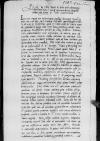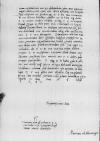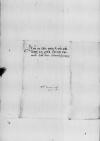List #3118
Martin ALLEXWANGEN do Ioannes DANTISCUSCracow (Kraków), 1547-06-12
| odebrano Heilsberg (Lidzbark), 1547-06-26 Rękopiśmienne podstawy źródłowe:
| ||||
Tekst + aparat krytyczny + komentarz Zwykły tekst Tekst + komentarz Tekst + aparat krytyczny
Reverendissimo in Christo Patri et Domino, domino
Reverendissime in Christo Pater et Domine, domine clementissime.
Humillima mea et numquam intermoritura obsequendi studia sint Reverendissimae Dominationi Vestrae commendata.
Etsi per ingenii mei infirmitatem intellego, Clementissime Praesul et Domine, me non posse satis oratione illustrare significationem vocabuli, de qua in praesentia apud Clementiam Vestram sum acturus, utpote de gratitudine, digna cum viris bonis omnibus virtute, tum praesertim honestarum artium ac litterarum studiosis. Etenim cum maximarum vere virtutum sit nutrix, eam ab omnibus etiam summo studio colendam esse iudicant.
Cum tamen et me peculiaris quaedam ratio ad hanc virtutem amplectendam nunc impellat, mihi velim dari veniam, ut pauca de ea verba apud Clementiam Vestram faciam. Nam quotienscumque mecum reputo, Clementissime Praesul, quam aequus iudex Clementia Vestra fuerit in dirimenda inter me et dominum Niviosnisky orta olim controversia, de beneficio illo ecclesiastico parochiae in  BCz, 1599, p. 840 etiam constituemus non esse dubitandum, quin Deo poenas ingrati daturi sint, grati autem summo afficiendi sint beneficio.
BCz, 1599, p. 840 etiam constituemus non esse dubitandum, quin Deo poenas ingrati daturi sint, grati autem summo afficiendi sint beneficio.
Quod reliquum est, gratias ago Clementiae Vestrae pro tam immensis in me collatis beneficiis, quibus me in hunc usque diem Clementia Vestra ornare semper studuit, aulaeque Clementiae Vestrae assumpsit, deinde reverendissimo in Christo patri,
Cui me quantum possum cum omnibus fortunis meis quam humiliter offero.
Eiusdem Reverendissimae Dominationis Vestrae obsequentissimus cliens
Postscript:
Novarum rerum quod scribam Reverendissimae Dominationi Vestrae, non habeo, nisi


